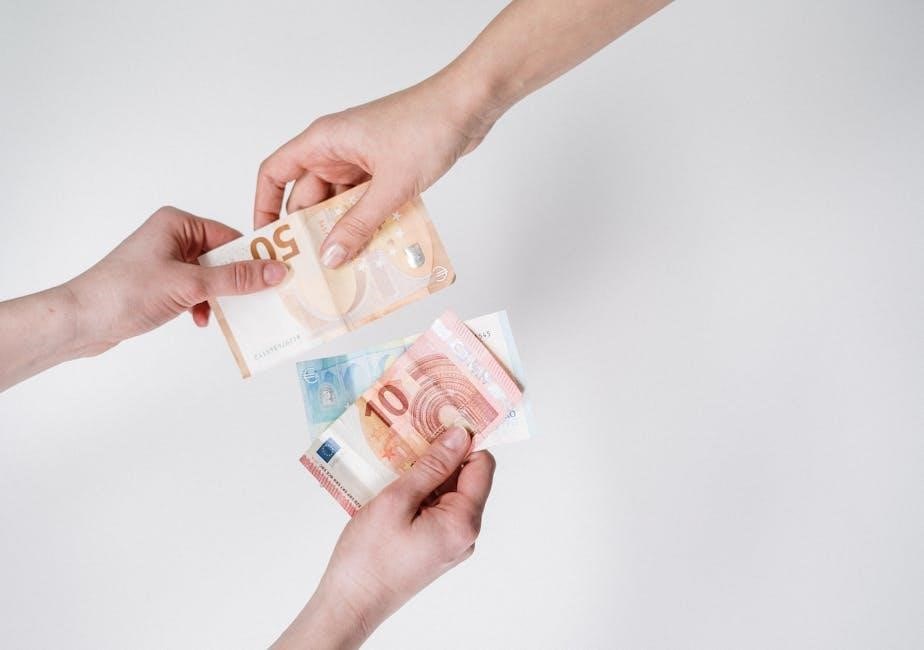The Agyapa Deal is a controversial transaction involving Ghana’s gold royalties, aiming to raise capital through an Initial Public Offering (IPO). The deal has sparked debates over sovereignty, transparency, and economic benefits, with civil society organizations expressing strong resistance. The Agyapa Deal PDF outlines the framework for monetizing future gold royalties, highlighting its potential impact on Ghana’s mining sector and national revenue generation.
1.1 Overview of the Agyapa Deal
The Agyapa Deal involves the creation of Agyapa Royalties Ltd., a company assigned Ghana’s gold royalties, with 49% sold through an Initial Public Offering (IPO). The government retains 51%, aiming to generate capital for national development; The deal, structured under the Minerals Income Investment Fund (MIIF) Act, has faced criticism over sovereignty concerns and potential undervaluation of Ghana’s mineral resources. Transparency issues and civil society resistance have further complicated its implementation, highlighting the need for balanced economic benefits and national control.
1.2 Significance of the Agyapa Deal PDF
The Agyapa Deal PDF serves as a critical document outlining the structure and implications of the transaction. It provides detailed insights into the financial framework, legal agreements, and stakeholder roles, ensuring transparency for public scrutiny. The PDF has become a focal point for analysis, enabling civil society and policymakers to assess the deal’s potential impact on Ghana’s economy and sovereignty. Its significance lies in its role as a reference for understanding the monetization of gold royalties and the associated risks and benefits, fostering informed discourse and decision-making.

Background and Context
The Agyapa Deal emerged amid Ghana’s economic challenges, aiming to monetize gold royalties. It faced legal disputes and civil society resistance, sparking debates on sovereignty and benefits.
2.1 Historical Context of the Agyapa Deal
The Agyapa Deal traces back to 2020 when Ghana sought to leverage its gold reserves. The government aimed to create Agyapa Royalties Ltd., monetizing future royalties through an IPO. This initiative followed earlier attempts to optimize mining revenues. Civil society and opposition groups criticized the deal, highlighting concerns over sovereignty and transparency. Legal challenges ensued, with the ECOWAS court ruling in 2023, though not halting the deal. Historical contexts reveal Ghana’s long-standing efforts to maximize mining benefits, with Agyapa representing a novel approach.
2.2 Key Stakeholders Involved
The Agyapa Deal involves multiple stakeholders, including the Government of Ghana (GoG), Agyapa Royalties Ltd., and civil society organizations. The Ministry of Finance plays a central role in structuring the transaction. Civil society groups, such as Transparency International, have actively opposed the deal, raising concerns over transparency and sovereignty. The ECOWAS Court is another key stakeholder, having ruled on legal challenges related to the deal. Additionally, Jersey, a tax haven, is involved due to the Double Taxation Agreement (DTA) with Ghana, further complicating the deal’s regulatory landscape.
Structure of the Agyapa Deal
The Agyapa Deal involves creating Agyapa Royalties Ltd. to manage Ghana’s gold royalties, with 49% sold via an IPO and 51% retained by the government.
3.1 Agyapa Royalties Agreements
The Agyapa Royalties Agreements outline the framework for monetizing Ghana’s gold royalties through a special purpose vehicle, Agyapa Royalties Ltd. These agreements, governed by the MIIF Act, enable the transfer of future gold royalties to the company. A total of 49% of the royalties is slated for sale via an Initial Public Offering (IPO), while the remaining 51% is retained by the government. The agreements aim to optimize revenue generation and ensure long-term financial benefits for Ghana, while addressing concerns over sovereignty and control.
3.2 Transaction Documents and IPO Details
The transaction documents for the Agyapa Deal include agreements facilitating the monetization of Ghana’s gold royalties. The IPO details reveal plans to sell 49% of Agyapa Royalties Ltd. on the London and Ghana Stock Exchanges. The IPO aims to raise upfront capital, estimated at $500 million, to address Ghana’s financial needs. The documents also outline the structure of the transaction, ensuring compliance with the MIIF Act and amendments, while addressing valuation concerns and potential risks associated with transferring future royalties to an offshore entity registered in Jersey.

Financial Aspects
The Agyapa Deal aims to generate revenue through gold royalties, with plans to raise $500 million upfront. However, concerns over undervaluation and loss of royalties persist.
4.1 Revenue Generation Through Royalties
The Agyapa Deal proposes generating revenue by monetizing Ghana’s gold royalties through a special purpose vehicle. This structure allows the government to leverage future royalties to raise capital upfront, potentially strengthening public finances. The deal assigns a significant portion of gold royalties to Agyapa Royalties Limited, which would then be listed on the stock market. This approach aims to create a steady revenue stream while ensuring Ghana retains majority ownership, balancing immediate financial needs with long-term economic benefits. The model aligns with global practices in mineral resource monetization.
4.2 Valuation and Potential Loss of Gold Royalties
The Agyapa Deal has raised concerns about the undervaluation of Ghana’s gold royalties, potentially leading to significant financial losses. Critics argue that the upfront $500 million sought through the transaction undervalues long-term revenue from gold reserves. The deal assigns 49% of royalties to a new company, with Ghana retaining 51%, but this structure risks ceding control over a valuable national resource. The valuation methodology has been questioned, highlighting fears of shortchanging the nation’s mineral wealth. This criticism underscores the need for transparent and equitable resource monetization strategies to safeguard Ghana’s economic interests.

Legal and Regulatory Framework
The Agyapa Deal is governed by the MIIF Act and its amendments, ensuring legal compliance. A Double Taxation Agreement (DTA) with Jersey addresses tax obligations, safeguarding Ghana’s interests.
5.1 MIIF Act and Amendments
The MIIF Act and its subsequent amendments form the legal backbone of the Agyapa Deal, outlining the framework for monetizing Ghana’s gold royalties. These amendments ensure compliance with national and international financial regulations. They establish clear guidelines for the transaction, protecting Ghana’s interests while facilitating the deal’s execution. The Act’s provisions are crucial for ensuring transparency and accountability in the management of mineral resources. By adhering to the MIIF Act, the government aims to balance economic benefits with legal and ethical standards.
5.2 Double Taxation Agreement (DTA) with Jersey
The Double Taxation Agreement (DTA) with Jersey is a critical component of the Agyapa Deal, designed to prevent double taxation on royalties. This agreement creates a binding constraint for Ghana, ensuring that Agyapa Royalties are taxed appropriately. The DTA aims to enhance tax efficiency for investors while maintaining compliance with international tax standards. However, concerns have been raised about its potential impact on Ghana’s ability to tax its own natural resources effectively. The negotiation of this agreement underscores the government’s efforts to attract foreign investment and streamline financial transactions related to the deal.

Controversies and Criticisms
The Agyapa Deal has faced significant backlash due to concerns over sovereignty, transparency, and undervaluation of Ghana’s gold royalties. Critics argue that the deal prioritizes foreign investor interests over national benefits, risking long-term economic losses. Civil society organizations have strongly opposed the transaction, citing lack of public consultation and potential corruption risks. These criticisms have led to widespread public resistance and calls for parliamentary scrutiny.
6;1 Concerns Over Sovereignty and Control
The Agyapa Deal has sparked concerns about Ghana’s sovereignty, as it transfers a significant portion of gold royalties to an offshore company. Critics argue this arrangement undermines national control over natural resources and could lead to long-term economic losses. The ECOWAS court’s decision not to stop the deal has further fueled worries about foreign influence and the erosion of Ghana’s ability to manage its own mineral wealth. Civil society organizations emphasize that such transactions jeopardize sovereignty and prioritize foreign investor interests over national benefits.
6.2 Transparency Issues and Civil Society Resistance
Transparency issues surrounding the Agyapa Deal have been a focal point of criticism, with civil society organizations accusing the government of inadequate disclosure. The lack of clear details about the deal’s terms and potential risks has fueled public distrust. Civil society groups have mobilized resistance, advocating for greater accountability and challenging the deal’s legitimacy. Their efforts aim to ensure that Ghana’s natural resources are managed in the public interest, rather than benefiting private or foreign entities, and that such transactions adhere to principles of good governance and national sovereignty.

The Role of Civil Society Organizations
Civil society organizations played a pivotal role in mobilizing resistance and advocating for transparency in the Agyapa Deal, challenging its implications on national sovereignty and accountability.
7.1 Mobilization and Advocacy Against the Deal
Civil society organizations (CSOs) actively mobilized resistance against the Agyapa Deal, organizing campaigns, petitions, and public forums to raise awareness about its potential risks. They argued that the deal undermined Ghana’s sovereignty and could lead to undervaluation of gold royalties. Key organizations like Transparency International and the Ghana Integrity Initiative highlighted concerns over transparency and accountability. Their advocacy efforts emphasized the need for broader public consultation and equitable resource management, framing the deal as a symbolic issue of governance and national interest.
7.2 Symbolic Counter-Conduct and Public Awareness
Civil society organizations employed symbolic counter-conduct strategies to challenge the Agyapa Deal, using public art, media campaigns, and grassroots mobilization to critique its implications. These efforts aimed to raise public consciousness about sovereignty risks and financial transparency concerns. By framing the deal as a symbol of governance shortcomings, CSOs fostered a national dialogue on resource management. Their actions, though largely symbolic, played a crucial role in sustaining public debate and advocating for accountability, ensuring the deal remained a prominent issue in Ghana’s political and social discourse.

Government’s Perspective and Justification
The government views the Agyapa Deal as a strategic move to raise capital and generate revenue through gold royalties, emphasizing its ability to avoid debt and provide a sustainable financial model. They argue that the deal’s structure ensures value for money and aligns with Ghana’s economic goals.
8.1 Economic Benefits and Capital Raising
The Agyapa Deal is presented as a mechanism to unlock Ghana’s mineral resources for economic growth. By monetizing future gold royalties, the government aims to raise upfront capital, estimated at $500 million, to fund infrastructure and development projects. This approach avoids traditional debt, offering a cost-effective solution. The deal is expected to enhance Ghana’s fiscal stability and attract foreign investment, leveraging the country’s position as Africa’s largest gold producer. It aligns with broader strategies to optimize resource utilization for national development.
8.2 Addressing Value for Money Concerns
The Agyapa Deal faced concerns about value for money, with critics highlighting potential undervaluation and loss of sovereignty. The government argued that the transaction offered a lower cost of capital compared to traditional debt, with no repayment obligations. However, transparency issues and the long-term implications of ceding gold royalties raised skepticism. Civil society organizations and experts questioned whether the deal truly maximized benefits for Ghana, emphasizing the need for clearer accountability and public oversight.

The ECOWAS Court Ruling
The ECOWAS Court ruled that the Agyapa Deal could proceed, rejecting calls to halt the transaction. The decision upheld Ghana’s right to monetize its gold royalties.
9.1 Legal Challenges and Court Decision
The Agyapa Deal faced legal challenges in the ECOWAS Court, with petitioners arguing it violated Ghana’s sovereignty and resource control. The court ruled in favor of Ghana, permitting the deal to proceed without injunctions. The decision emphasized Ghana’s right to manage its resources and upheld the legality of the transaction under international law. This ruling was significant, as it addressed concerns about national sovereignty while allowing the government to explore innovative financing strategies for its mining sector.
9.2 Implications of the Ruling
The ECOWAS Court’s decision to allow the Agyapa Deal to proceed has significant implications for Ghana’s resource management and sovereignty. While the ruling dismissed the injunction, it highlighted concerns about transparency and long-term resource control. Critics argue the deal could set a precedent for undervaluing national assets, potentially undermining Ghana’s ability to maximize benefits from its gold reserves. Civil society organizations remain vigilant, emphasizing the need for accountability and equitable resource distribution to ensure public interest is prioritized over private gains.

Future Prospects and Resubmission
The government plans to resubmit the Agyapa Deal to Parliament, addressing prior concerns to ensure transparency and maximize benefits for Ghana’s mining sector and economy.
10.1 Plans for Resubmission to Parliament
The government has expressed intentions to resubmit the Agyapa Deal to Parliament, addressing previous concerns to ensure transparency and public confidence. The proposed transaction aims to raise capital through an Initial Public Offering (IPO), with 49% of gold royalties allocated for sale. The resubmission will focus on clarifying value for money concerns and enhancing stakeholder engagement. Parliament’s approval is crucial for the deal’s implementation, ensuring alignment with national interests and fostering long-term economic benefits for Ghana’s mining sector.
10.2 Potential Impact on Ghana’s Mining Sector
The Agyapa Deal could significantly influence Ghana’s mining sector by generating substantial revenue through gold royalties. Proponents argue it will attract foreign investment and stabilize public finances. However, critics fear undervaluation of assets and loss of long-term control over natural resources. The deal’s implementation may also set a precedent for future mineral resource transactions, potentially reshaping the sector’s dynamics. While it offers short-term economic benefits, concerns persist about sovereignty and equitable resource management, necessitating a balanced approach to ensure sustainable growth and national interests are prioritized.

Comparative Analysis with Similar Deals
The Agyapa Deal differs from initiatives like the Goldbod program, which focuses on in-country gold transactions. Unlike Agyapa, Goldbod is wholly Ghanaian-owned, emphasizing local control and immediate practical benefits.
11.1 Comparison with Goldbod Initiative
The Agyapa Deal and the Goldbod Initiative differ significantly in structure and objectives. While Agyapa involves selling 49% of Ghana’s gold royalties to an offshore company, Goldbod focuses on buying, assaying, and exporting gold within Ghana. Unlike Agyapa, Goldbod is wholly owned by Ghana, emphasizing local control and immediate economic benefits. Agyapa aims to monetize future royalties, whereas Goldbod seeks to add value through domestic processing. This contrast highlights differing approaches to resource management and economic strategy, with Agyapa facing criticism for transparency issues, unlike Goldbod’s clearer, more localized framework.
11.2 Lessons Learned from Other Transactions
Lessons from similar transactions highlight the importance of transparency, valuation accuracy, and sovereignty in resource deals. Unlike Agyapa, other initiatives prioritized local control and clearer revenue distribution. The Goldbod Initiative, for instance, focused on domestic processing and immediate economic benefits, avoiding the complexities of offshore transactions. These examples underscore the need for robust legal frameworks and stakeholder engagement to prevent undervaluation and ensure long-term benefits. Such insights could guide future resource monetization efforts, emphasizing accountability and national interest to avoid Agyapa-like controversies.
The Agyapa Deal remains a contentious yet pivotal initiative in Ghana’s resource management, highlighting the need for transparency, accountability, and balanced economic strategies to ensure national benefit.
12.1 Summary of Key Points
12.2 Final Thoughts on the Agyapa Deal
The Agyapa Deal remains a polarizing issue, balancing economic potential with concerns over sovereignty and transparency. While it offers capital-raising opportunities, its implementation has fueled resistance. Civil society’s symbolic counter-conduct highlights the need for greater accountability. The government’s persistence suggests confidence in its benefits, yet addressing value-for-money concerns is crucial. The deal’s future hinges on addressing transparency issues and ensuring equitable resource management, ultimately requiring a balanced approach to harness Ghana’s mineral wealth responsibly while maintaining public trust and national interests.
References and Further Reading
Refer to the Agyapa Royalty Transaction Chart and relevant PDF documents for detailed insights. Additional resources are available on myxyzonline.com and resourcegovernance.org for comprehensive analysis.
13.1 Agyapa Royalty Transaction Chart and Notes
The Agyapa Royalty Transaction Chart provides a detailed visual representation of the deal’s structure, including stakeholders, revenue flows, and financial projections. Accompanying notes explain the transaction’s legal and operational framework. The chart is available as a PDF, along with tables and presentation slides, offering insights into the allocation of gold royalties and the IPO process. It outlines the roles of key entities and the governance structure under the MIIF Act, ensuring transparency in the monetization of Ghana’s mineral resources. This resource is essential for understanding the deal’s complexities and implications.
13.2 Relevant PDF Documents and Resources
Several PDF documents are available, offering in-depth analysis and details on the Agyapa Deal. These include the transaction chart, notes, and agreements, which provide comprehensive insights into the structure and implications of the deal. Resources such as the Agyapa Royalty Transaction Chart and accompanying tables are accessible online, allowing stakeholders to review the financial projections and legal frameworks. These materials are crucial for understanding the deal’s potential impact on Ghana’s mining sector and its alignment with national economic goals. They serve as essential reference points for policymakers, researchers, and the general public.
